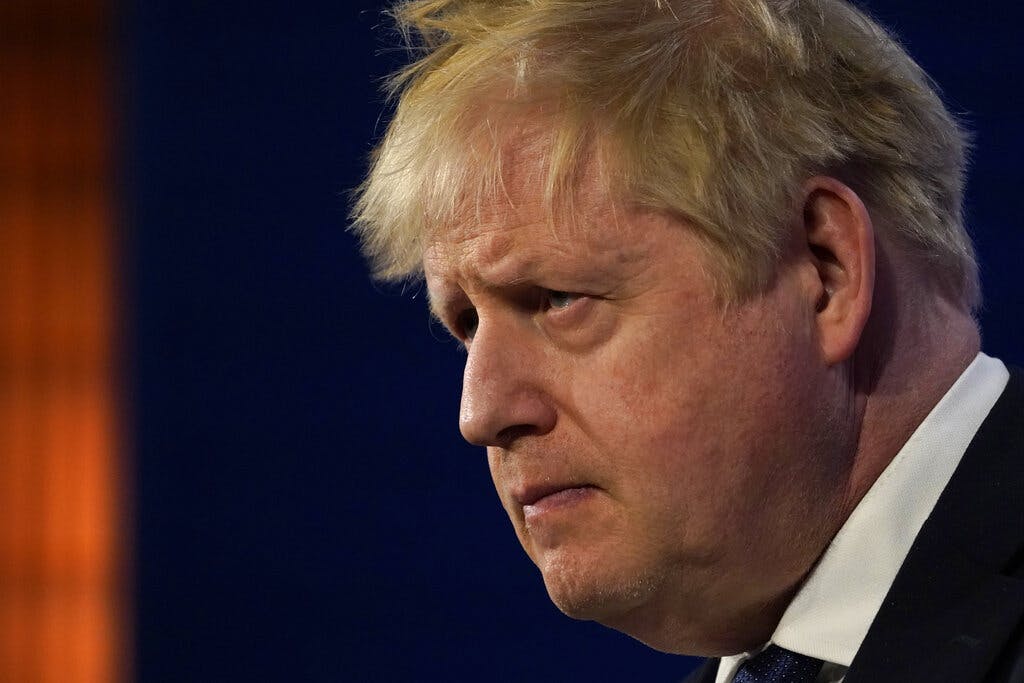Britain Aims To Squeeze Oligarchs in Bid To Choke Putin
Prime Minister Johnson said a bill would ‘whip aside the veil of anonymity’ used by oligarchs to obscure ownership of properties.

ATHENS — The Russian oligarchs who have made luxurious perches for both themselves and their bank accounts in the City of London may be looking for new places to roost if U.K. lawmakers pass a bill aimed at toughening sanctions on Russia and rooting out ill-gotten money from the British economy.
Prime Minister Johnson said the Economic Crime Bill would let British authorities pursue President Putin’s allies in the U.K. “with the full backing of the law, beyond doubt or legal challenge.”
Earlier in the day Mr. Johnson, who met with Prime Minister Trudeau of Canada and the Dutch leader, Mark Rutte, to discuss toughening the West’s response to the Russian invasion of Ukraine, said the new bill would “whip aside the veil of anonymity” used by oligarchs to obscure ownership of properties. He added that the United Kingdom “will do everything it can to make sure that Putin fails in his catastrophic invasion of Ukraine.”
Opposition politicians and anti-corruption campaigners say Mr. Johnson’s Conservatives have allowed ill-gotten money to slosh into U.K. properties, banks, and businesses for years, turning London into a “laundromat” for dirty cash.
Mr. Johnson has repeatedly claimed that Britain is leading international efforts to punish Mr. Putin over the invasion of Ukraine. The U.K. has slapped sanctions on a host of Russian banks and businesses, measures the government says have curtailed more than $330 million worth of Russian economic activity, and today it pledged more financial assistance to Ukraine. So far, though, Downing Street has sanctioned only a handful of Kremlin-linked individuals with assets in Britain, fewer than either the European Union or America.
The new bill would require overseas firms with assets in Britain to disclose their true owners, an attempt to crack down on money-laundering and the use of shadowy shell companies to buy businesses and properties.
Initially, the legislation gave businesses 18 months to comply. That has been shortened to six months — but critics say it should be even shorter. A Labour Party spokesman said the grace period amounted to a “get out of London free card” for oligarchs.
Opposition lawmakers are urging the government to immediately seize oligarchs’ properties in Britain, emulating Italy, which has seized $156 million in luxury yachts and villas from rich Russians.
Britain’s Conservatives, in power since 2010, pride themselves on making the U.K. an attractive place for the world’s wealthy to live and invest. Many of the ultra-rich own London mansions, send their children to English private schools, and employ fleets of p.r. consultants and lawyers to tend their reputations — helped by Britain’s claimant-friendly libel laws.
The anti-corruption group Transparency International says Russians linked to the Kremlin or accused of corruption own $2 billion worth of London property.
In a damning 2020 report whose release was delayed for months by the government, Parliament’s Intelligence and Security Committee said that since the 1990s Britain has “welcomed Russian money, and few questions — if any — were asked about the provenance of this considerable wealth.”
“There are a lot of Russians with very close links to Putin who are well integrated into the U.K. business and social scene, and accepted because of their wealth,” the report said.
Transparency campaigners say the governing Conservatives have received $2.7 million in donations from people linked to Russia since Mr. Johnson became prime minister in 2019. The party says all its donors are registered U.K. electors, as the law demands.
Opposition politicians are demanding to know why Mr. Johnson gave a noble title and a seat in Parliament’s House of Lords to Evgeny Lebedev, the Russia-born owner of two British newspapers. His oligarch father, Alexander Lebedev, is a former KGB agent, and the Sunday Times newspaper reported that British intelligence agencies had expressed concerns about the 2020 appointment.
Adding to the new anti-Russian atmosphere in Westminster, London’s Evening Standard reported that last week that a Tory MP, Bob Seely, used parliamentary privilege to name “amoral” lawyers he claimed had allowed Vladimir Putin’s “henchmen” to intimidate the free press in Britain. Mr. Seely told the House of Commons that prominent legal firms were in effect offering “legalized intimidation” to oligarchs to silence their rivals.
An expert on money-laundering whose new book “Butler to the World” explores Britain’s relationship to global wealth, Oliver Bullough, said the new legislation contained multiple loopholes and would not choke off dirty money.
He said that for decades Britain had prioritized “the fees that its financial services sector could earn from oligarchs over checking the origin of the money.”
“We lack the state capacity to track oligarchs’ money, we lack the people, the experts in government, who are able to know how to craft useful sanctions,” he added. “All of those things are, frankly, an embarrassment.”
Even if the bill passes into law, just how effective it will be in impeding the progress of Mr. Putin’s war machine remains to be seen. The Daily Telegraph’s Jeremy Warner wrote that “yacht seizures and other tokenistic retaliation won’t make a difference” as long as Europe buys Russian oil and gas.
